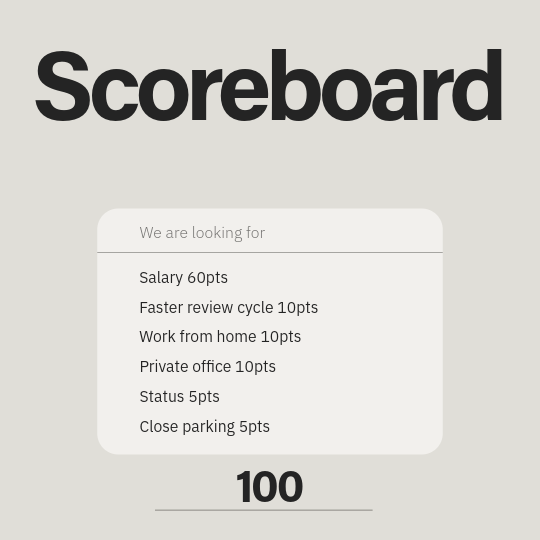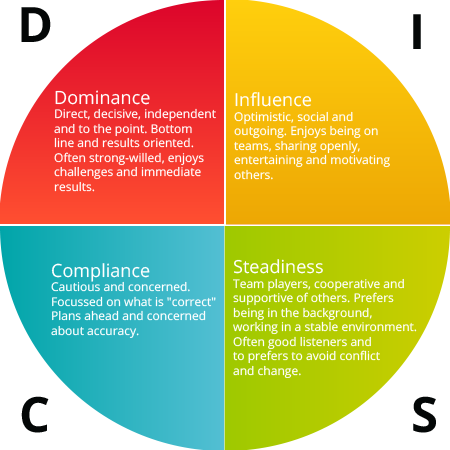Learning to Negotiate

Like any skill the more practise you have the better the outcome.
We negotiate all the time. Meetings are often a form of negotiation.
Preparation
If you are someone who is terrified of negotiations, really thorough preparation is key. It may be the perceived conflict you are scared of. Perhaps a previous bad experience has tainted your view of negotiation.
If you look at the negotiation as a joint problem solving exercise it will change the fear factor.
Think about who benefits from your outcome. We are often better at negotiating on behalf of others. Perhaps consider the benefits to your family for a successful outcome.
Know what you want
In preparing for the conversation you are about to have be sure you know what you want.
One technique is a scoreboard.

If for example you are giving up an item in this scoreboard you will know what it is worth.
BATNA
BATNA is an acronym that stands for best alternative to a negotiated agreement.
"Do you have other offers?"
You should try to avoid revealing exactly what your BATNA is. You may then only receive an offer slightly above that.
Understand the oppositions possible positions
The two things that any negotiator has to prepare before they go into negotiations-:
1. they have to really understand themselves and their own goals and needs and wants.
2. they have to develop as deep understanding as they can of the other person.
Communication Styles DISC
If we identify our own and others' preferred DISC communication styles, we potentially possess an effective tool to better interact with them.

Knowing your value is important. Take some time to analyse how others may perceive your value. You may have a skill-set in demand or 100% necessary.
Strengths Weaknesses Opportunities Threats (SWOT Analysis) is a technique to access a situation, your business or yourself.
Decision Tree Analysis is good for looking at the consequences and outcomes of a decision. It usually accesses 3 outcomes like 1. good, 2. most likely and 3. poor. Decision Tree Analysis is useful if there is data to go by. In making decisions another school of thought is there is not always a correct decision so make the decision right. This removes the stress of close decisions.

Posture Position
As much as possible try to negotiate in neutral territory. Sitting in a plush office is hardly putting yourself in the best position.
Never turn up late - turn up early. The negotiation starts when you are on the premises.
You may be nervous but often this is not noticeable to others.
Consider where you sit. When the option comes to sit where there are multiple people with different actual power - consider sitting in a powerful position. Refer Understanding Body Language In Meetings
A powerful position to sit is directly opposite the most powerful person. (not in the corner out of direct eye sight)
If the key person you are negotiating with is known to "power dress" consider matching them, and don't be afraid to use your best perfume/cologne.
Be aware of tactics used by some negotiators to display their power by ordering staff around in front of you.

Don't rush
You are at the meeting.
What if there is a reason for urgency for the other party?
You may discover in your general preamble that a certain project needs you.
Watch your tone
When speaking with others, your tone clarifies and conveys meaning. This is an interesting article on tone with a sub title "How female leaders are still being penalized for not having a penis."
Listen
The concept of Deep Listening is quite different to active listening.

Negotiation with Tradies
Supply and demand is a key consideration for a tradie. But you must be aware of the current demand and a rough idea of possible prices.
Any knowledge you have on the issue at hand is a benefit. For example there is a leak in your bathroom. You need to know the probable cause of that leak.
Understanding call-out fee structures and whether your issue requires multiple trips to your premises.
If a tradie has been recommended, mention that to them. This is a version of the 'halo effect' where someone is judged to be good and then acts that out by being good.
It never hurts to be able to quickly estimate the hourly rate a quote contains and the approximate cost of materials. Even ask the tradesman to give an estimate.
Negotiating at a Body Corporate meeting
Body Corporate meetings are a great chance to get some negotiating practise. There are people with various backgrounds and experience.
If you know and support the issues of your fellow unit owners, there is a better chance they will support you if you have a specific issue.
Some issues will end up in dispute. In these cases know the rules that apply. Why bother getting into a dispute over an issue that simply cannot happen.
Creating a scoreboard (as above) nominating issues that are important to you would also be helpful.
Negotiating a pay rise
Employees are at a disadvantage when they're going in blind. The company knows everything about the compensation available.
Negotiating a price on a property
My parents quaint holiday shack turned into an "asbestos hot box" when the real estate agent was trying to flog it off.
Again knowing your limits but not necessarily giving them away. For example if you say you would accept 700k the agent may not bother pushing for a better price.
Macquarie.com.au include "Be prepared to waive certain things when negotiating your property purchase" in their negotiation tips.
Perhaps we could not react when the agent calls the property "an asbestos hot box".
One property owner got the sale they wanted by including the Jet Ski moored on his private landing.
Another property owner had a famous Mark Richards wall mounted surfboard. The buyer was so taken by the effect, that when the owner offered his prized possession as part of the sale it sold.
 Not the actual board
Not the actual board
References and Sources
The art of negotiation: How to ask for a pay rise
Jennifer Overbeck - Associate Professor of Management, Melbourne University Business School
Dave Wolovsky - Lead Negotiator, Next Level Negotiation
Lisa Leong, Presenter
Zoe Ferguson, Producer
Broadcast 15 Sep 2023
https://www.abc.net.au/listen/programs/this-working-life/negotiating-a-pay-rise/102784302
GoldCoastLogin.com.au DISC Communication Styles
HearingAidsAustralia.com Deep Listening
SEARCH ARTICLES
Recent Posts
- Jul, 22, 2025
Who is responsible for that water leak?
- May, 6, 2025
Diversity on Boards
- Apr, 11, 2025
When does asbestos become dangerous in your home?
- Jan, 23, 2025
How Design Aesthetics Shape Perceived Value
- Dec, 10, 2024
Impact of Inflation on First-Time Buyers
- Nov, 4, 2024
How to understand and check your credit score
- Sep, 19, 2024
Buying off the plan? Beware of sunset clauses
- Jul, 5, 2024
Essential Workers Explained
- Jun, 13, 2024
Ozone Generators to remove Mould
- Feb, 19, 2024
Massive tax handouts for property investors
- Feb, 16, 2024
Body Corporate sinking fund - QLD
- Feb, 2, 2024
Scaffolding Safety
- Jul, 11, 2023
Pension Age Rises to 67
- May, 18, 2023
Becoming A Registered Builder In Australia
- Apr, 17, 2023
Forced Sales - Queensland - 75% Rule
- Dec, 6, 2022
Petty Landlords & Negative Gearing
- Sep, 19, 2022
The benefits of shade sails for your home
- Jul, 27, 2022
Termite Swarmers Season
- Jun, 22, 2022
Fear of missing out driving inflation
- Apr, 28, 2022
Australia's Rental Crisis
- Mar, 7, 2022
Should you buy a home with Termite damage?
- Mar, 3, 2022
Tactics to reduce body corporate disputes
- Jan, 25, 2022
Globalisation - The Hedgehog & The Fox
- Nov, 2, 2021
Revealed: Top 10 areas to avoid buying
- Oct, 28, 2021
Is that house protected against termites?
- Sep, 15, 2021
Tree Changers & Sea Changers
- Aug, 12, 2021
COVID 19 and Body Corporate Responsibilities
- Jul, 29, 2021
Tenants beware of rental rewards schemes
- Jun, 25, 2021
Sunshine Coast versus Gold Coast
- Jun, 23, 2021
Your superannuation and your home
- Jun, 11, 2021
How many properties sit empty?
- May, 10, 2021
What Returns could I make from Property Investment
- May, 4, 2021
Real Estate Agents and Property Managers
- Apr, 20, 2021
Why You Need A Termite Inspection
- Mar, 19, 2021
SEO for Real Estate websites
- Mar, 18, 2021
Three Reasons Why Your Home Needs Data Cabling
- Mar, 16, 2021
Smoke Alarms: What you need To know in QLD
- Dec, 10, 2020
Pre-purchase Electrical Inspection
- Dec, 4, 2020
Why should I drink Adelaide Hills Wines?
- Aug, 26, 2020
Amalgamation of Strata-titled Lots for Development
- Jul, 28, 2020
Adelaide Hills a unique region
- Apr, 28, 2020
Ozone Generator in Your Home
- Apr, 21, 2020
Air conditioning cleaning
- Apr, 14, 2020
Housing Affordability in Australia
- Apr, 6, 2020
Security Systems
- Mar, 31, 2020
Termites and protecting the home
- Feb, 27, 2020
Printing for the Real Estate Industry
- Nov, 12, 2019
Beware of Property Investment Spruikers
- Oct, 31, 2019
Prices for Home Alarm Monitoring
- Oct, 9, 2019
House and Land packages best investment
- Oct, 1, 2019
The 'Scourge' of Underquoting
- Oct, 16, 2017
Professional Pest Control
- Sep, 29, 2017
Built in Wardrobes
- Jul, 9, 2015
Pool Inspections Queensland
- Jun, 25, 2015
Negotiating your purchase with the Inspection
- May, 12, 2015
DIY Move or hire a removalist company?
- Nov, 19, 2014
Why are housing prices rising faster than wages?
- Jan, 17, 2014
The Friendliest Real Estate Agents
- Jul, 23, 2013
A thorough Building and Pest Inspection
- Sep, 28, 2012
How to Compare Home Loans
- Jan, 25, 2012
Southport Real Estate

